|
|
|
Sort Order |
|
|
|
Items / Page
|
|
|
|
|
|
|
| Srl | Item |
| 1 |
ID:
140386
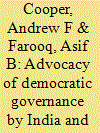

|
|
|
|
|
| Summary/Abstract |
This article examines the patterns of consistency and inconsistency between how India and China advocate democratisation at the global and national levels. Addressing this question through a dualistic framework, we develop a detailed map of the rhetorical promotion of democratic governance by India and China through an analysis of 10 years of foreign affairs speeches, remarks, interviews and statements of political elites of both countries. The article argues that although China has not shied away from declarations on democracy domestically as well as on global governance, the contradictions between the clear and consistent push for democracy and equity at the global level and the highly contingent commitment to democracy at the national level remain highly salient. India’s deficiencies, by way of contrast, come not in the domain of legitimacy but effectiveness. India’s struggle to translate its domestic democratic credibility into more equitable representation at the global institutional level and into a stellar economic model at the domestic level exposes it to criticism in relationship to China. Yet, even with these gaps, the article concludes that India has some comparative advantages over China precisely because it can play a consistent two-level game in terms of the promotion of democracy both at global and state levels.
|
|
|
|
|
|
|
|
|
|
|
|
|
|
|
|
| 2 |
ID:
121220
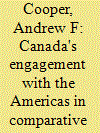

|
|
|
|
|
| Publication |
2012.
|
| Summary/Abstract |
Recent Canadian prime ministers have embraced the hemisphere of the
Americas, albeit in a differentiated and uneven fashion. Brian Mulroney
is commonly credited with "discovering" the Americas largely through
the decision to ?nally join the Organization of American States (OAS)
in 1989.1
Jean Chrétien pushed the "more amigos the better" approach
through support for the Free Trade Area of the Americas, the summit of
the Americas process, and the targeting of Team Canada activities in the region.2
|
|
|
|
|
|
|
|
|
|
|
|
|
|
|
|
| 3 |
ID:
164980
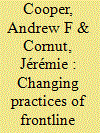

|
|
|
|
|
| Summary/Abstract |
This article develops the concept of ‘frontline diplomacy’ – what practitioners referring to work in embassies, consulates, and permanent representation as ‘the field’ –, defined here as all diplomats’ activities taking place away from headquarters. IR scholarship tends to focus on Ministries of Foreign Affairs located in capitals. On the contrary, building on the practice turn in IR, we first show that international politics emerge from frontline practices. Adding to criticism against the practice turn, we then explain that it has missed important transformations occurring in frontline diplomacy because it tends to privilege stability over change. We finally discuss two innovations in frontline practices: the action of Sherpas in G20 summits following the 2008 crisis and the use of Twitter by US Ambassador to Russia Michael McFaul (2012–14). For each we answer three questions: How do these activities transform traditional modes of operation? How are non-state actors involved in them? What do they tell about transformation of global politics? Because diplomatic practices at the frontlines epitomise international politics, these new directions for inquiry contribute substantively to IR scholarship. At the theoretical level, they enrich the continuing encounter between IR and diplomatic studies through practice theory and help to understand change in practice.
|
|
|
|
|
|
|
|
|
|
|
|
|
|
|
|
| 4 |
ID:
173178
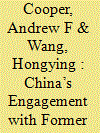

|
|
|
|
|
| Summary/Abstract |
In recent years many former heads of foreign governments have visited China, appearing at various forums, conferences, and other events. China’s engagement with these former leaders may appear to be a form of public diplomacy, but even more importantly it has been a strategy of political legitimation adopted by the Chinese Communist Party. Based on an original database of hundreds of cases, we provide a systematic analysis of the visits of former foreign leaders to China and of their role as external validators for the party-state and its policy initiatives, particularly the Belt and Road Initiative. By shedding light on the Party’s search for external consent and support, we seek to fill a significant gap in the literature, which tends to focus narrowly on the domestic sources of legitimacy and domestic strategies of legitimation.
|
|
|
|
|
|
|
|
|
|
|
|
|
|
|
|
| 5 |
ID:
153716
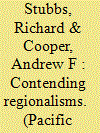

|
|
|
|
|
| Summary/Abstract |
As regions become more institutionalized, they are characterized by two competing trends. First, key regional institutions can become hub institutions that act as transmitters of a comprehensive set of norms. Second, as regional institutions increase in number, regions themselves are liable to become more fragmented. How these trends have played out is explored in two key regions, the Americas and the Asia-Pacific. It is concluded that regions are not static entities but are ever-changing structural arrangements. Hub institutions can be challenged and the consequences can be significant as regions gain in importance on the international stage.
|
|
|
|
|
|
|
|
|
|
|
|
|
|
|
|
| 6 |
ID:
170931
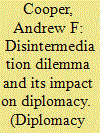

|
|
|
|
|
| Summary/Abstract |
This contribution to the Forum argues the research agenda on diplomacy has to be recalibrated: with a greater focus on how diplomacy is challenged domestically. This turbulence is intertwined with the rise of populism not from the periphery as largely featured in the past, but in the countries at the core of the international system, most noticeable in the Brexit campaign in Britain and the Donald Trump Administration in the United States. The challenge posed is that diplomacy – no less than other institutions – traditionally viewed positively as providing continuity and stability in terms of the national interest and identity has increasingly been stigmatized. Although distinctive national features cannot be ignored, a common feature in terms of generic cause and effect is an association with the concept of disintermediation highlighting a separation of diplomats not only from other components of governmental bureaucracy but citizens at large. The effect of disintermediation is more pervasive because of the use of social media and other means of going around established institutions. In addressing th is serious challenge, the research agenda must extend to comprehensive options for organisational maintenance in which the institution and operational machinery of diplomacy is re-directed towards delivery in the service of citizens.
|
|
|
|
|
|
|
|
|
|
|
|
|
|
|
|
| 7 |
ID:
153904
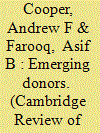

|
|
|
|
|
| Summary/Abstract |
This paper examines the evolving pattern of democracy promotion by three emerging donors: India, Brazil and South Africa. It first asks how the emerging donors promote democracy through their development assistance. The paper argues that despite the risk of compromising security and trade interests, the emerging donors have adapted to a 2 × 2 (two by two) model of democracy promotion by which they circumvent risk by promoting procedural democracy through bilateral means and non-procedural democracy through multilateral frameworks. Second, the paper asks why these three countries exhibit the same pattern of democracy promotion in spite of not having coordination among them. In response, the paper provides a structure–agent explanation. The paper contends that the structural constraints imposed on emerging donors are conducive to the operation of the 2 × 2 model in promoting democracy. While the model safeguards the emerging donors from criticism of being undue interveners in other countries' domestic affairs, it also privileges them with international recognition for being responsible partners in democracy promotion.
|
|
|
|
|
|
|
|
|
|
|
|
|
|
|
|
| 8 |
ID:
049966
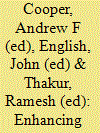

|
|
|
|
|
| Publication |
Tokyo, United Nations University press, 2002.
|
| Description |
xi, 308p.
|
| Standard Number |
928081074X
|
|
|
|
|
|
|
|
|
|
|
|
Copies: C:1/I:0,R:0,Q:0
Circulation
| Accession# | Call# | Current Location | Status | Policy | Location |
| 046300 | 341.2/COO 046300 | Main | On Shelf | General | |
|
|
|
|
| 9 |
ID:
163129
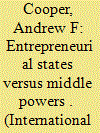

|
|
|
|
|
| Summary/Abstract |
This article highlights both the differences and similarities between the concepts of entrepreneurial states and middle powers. The use of the entrepreneurial state as the central framing device is distinctive in a number of ways, including reducing the emphasis on hierarchy in the global system. Yet for all the divergences, the two frames are indelibly intertwined, above all in privileging agency over structural positioning. In either case there is an element of constant flux and reinvention, which justifies ongoing research. Just when the elevation of the G20 and the appearance of MIKTA appeared to provide some discipline to the image of a middle power, the notion of entrepreneurial states stretches the number of countries to be included. At the same time, however, attributes that reflect some middle power sensibility are embedded within the entrepreneurial state set of practices.
|
|
|
|
|
|
|
|
|
|
|
|
|
|
|
|
| 10 |
ID:
123530
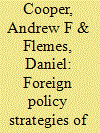

|
|
|
|
|
| Publication |
2013.
|
| Summary/Abstract |
This Introductory Review examines the major debates concerning the rise of emerging powers in the global system. It points to the fundamental difference between the contours of ascendancy in the first quarter of the twenty-first century from previous historical eras with reference to the number of countries placed in this category, the privileging of economic dimensions of power, and the much more elaborate and open levels with regard to institutionalization. Ample attention is paid to the BRICS, but consistent with the image of multipolarity, it also gives some emphasis to the question of whether the changing global system provides enhanced space for middle powers. After highlighting these highly relevant contextual considerations, the core of the Review moves to an analysis centred on more specific puzzles about the foreign policy strategies of emerging powers. One major puzzle is whether the preference of rising states is to work through established institutions or to utilize parallel and/or competitive mechanisms. Another concerns the balance between material interests, status-enhancement, and identity issues as motivators for policy preferences. Still another focuses on the degree to which China should be differentiated from the other BRICS, or indeed whether the BRICS share values such as a common politics of resentment or want to differentiate themselves on a normative-oriented basis in alterative groupings such as IBSA. A more sophisticated awareness of the limitations as well as of the capacities of the BRICS - with an appreciation of the intricate mix of concerns about solidarity and sovereignty, as well as conceptual tensions between realism and complex interdependence - is not only important for assessing the future trajectory of the BRICS role in the world, but in locating space for categories of countries such as middle powers. The major puzzle for middle powers is whether or not they will be able to mobilize attributes, notably the leveraging of 'network power', that provide them with comparative advantage. Although in overall terms the global system has not progressed towards multipolarity in a linear fashion underwritten by alternative actors, it is precisely due to this imprecision - and level of academic and operational contestation - that the articles assembled in this Special Issue have such salience.
|
|
|
|
|
|
|
|
|
|
|
|
|
|
|
|
| 11 |
ID:
096253
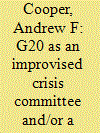

|
|
|
|
|
| Publication |
2010.
|
| Summary/Abstract |
Arguably the most important catalytic effect of the 'Great Recession' of 2008-2009 has been the creation of the G20 at the leaders' level. As a form of improvised diplomacy the G20 merits extensive scrutiny, revealing as it does the degree of adaptation possible in the international system. The G20 links a significant ideational component, a new dynamic between established and emerging powers, and a complex set of issues. The innovative quality of the G20, however, rests on two very distinct strands of activity and tests of accomplishments. The G20 can be viewed as a 'recession-buster' with a vital but momentary purpose. Alternatively, the G20 can be taken to be an embedded 'steering committee' for the world. Both of these interpretations have validity. The crisis committee scenario highlights a technical regulatory-driven agenda. The steering committee scenario by way of contrast showcases the connection between the G20 and a new type of global settlement. Passing the test as a crisis committee hinges on very specific deliverables. Passing the test as a steering committee is even more demanding as any move toward a new state-specific 'concert' is highly contested. This article examines these debates, locating the G20 in a historical/comparative perspective and in terms of the wider context of shifting power structure at the beginning of the twenty-first century.
|
|
|
|
|
|
|
|
|
|
|
|
|
|
|
|
| 12 |
ID:
141723
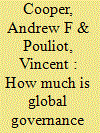

|
|
|
|
|
| Summary/Abstract |
Is the G20 transforming global governance, or does it reinforce the status quo? In this article we argue that as innovative as some diplomatic practices of the G20 may be, we should not overstate their potential impact. More specifically, we show that G20 diplomacy often reproduces many oligarchic tendencies in global governance, while also relaxing club dynamics in some ways. On the one hand, the G20 has more inductees who operate along new rules of the game and under a new multilateral ethos of difference. But, on the other hand, the G20 still comprises self-appointed rulers, with arbitrary rules of membership and many processes of cooption and discipline. In overall terms, approaching G20 diplomacy from a practice perspective not only provides us with the necessary analytical granularity to tell the old from the new, it also sheds different light on the dialectics of stability and change on the world stage. Practices are processes and as such they are always subject to evolutionary change. However, because of their structuring effects, diplomatic practices also tend to inhibit global transformation and reproduce the existing order.
|
|
|
|
|
|
|
|
|
|
|
|
|
|
|
|
| 13 |
ID:
080161
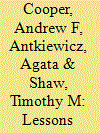

|
|
|
| 14 |
ID:
048919
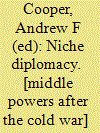

|
|
|
|
|
| Publication |
Hampshire, macmillan Press, 1997.
|
| Description |
viii, 221p.
|
| Series |
Studies in diplomacy
|
| Standard Number |
033368186X
|
|
|
|
|
|
|
|
|
|
|
|
Copies: C:1/I:1,R:0,Q:0
Circulation
| Accession# | Call# | Current Location | Status | Policy | Location | IssuedTo | DueOn |
| 039759 | 327.2/COO 039759 | Main | Issued | General | | DELNET | 11-Apr-2024 |
|
|
|
|
| 15 |
ID:
151379
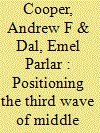

|
|
|
|
|
| Publication |
International Journal Vol: 71 No 4.
|
| Summary/Abstract |
This article argues that middle power diplomacy can be identified as having gone through three distinct waves. The first is connected with the immediate post-1945 global order, with a focus on multilateralism via the United Nations and related bodies. The second moved to ad hoc bursts of activism related to specific issue area niches. The third and current wave, by contrast, is embedded in the informal institutionalization associated with the G20. Just as the BRICS have used the G20 as a catalyst for differentiated activities both around and independent of the G20, the “missing middle” in the G20 (countries increasingly portrayed as middle powers beyond both the BRICS and the G7) have begun to explore the possibility of collective action. MIKTA (Mexico, Indonesia, Turkey, South Korea, and Australia), while possibly a significant advance in global governance, has the potential of hardening the categories of countries identified as middle powers. At the same time, the MIKTA countries face a number of serious constraints in terms of this global reach. Institutional elevation is compromised by practice limitations, most notably the hold of regional imperatives.
Keywords
|
|
|
|
|
|
|
|
|
|
|
|
|
|
|
|
| 16 |
ID:
192102
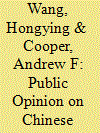

|
|
|
|
|
| Summary/Abstract |
The expanding profile of Chinese international development aid has generated strong academic and policy interests. A growing literature has emerged on Chinese foreign aid’s motivations, modalities, and impact. However, a significant lacuna remains in the domestic politics relating to this phenomenon. This gap is especially glaring in public opinion concerning China’s growing foreign aid programs. By analyzing empirical data gathered from a variety of sources, including a well-established online forum, social media sites of two influential media organizations, and multi-year surveys of residents of Beijing, this paper presents a nuanced picture of what the Chinese public thinks of Chinese foreign aid and tests two popular explanations of public opposition to foreign aid—perceived budgetary trade-offs and more general dissatisfaction with government policies.
|
|
|
|
|
|
|
|
|
|
|
|
|
|
|
|
| 17 |
ID:
108046
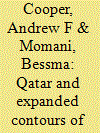

|
|
|
|
|
| Publication |
2011.
|
| Summary/Abstract |
It is increasingly obvious that Qatar is playing above its weight in the international role. There is no one script that defines Qatar's diplomatic role. It is best seen as a maverick, willing to work with the US as well as Hamas, Hezbollah and Iran. It operates a complex form of public diplomacy via Al-Jazeera and other high profile initiatives at the same time as it mediates behind the scenes with Israel and Lebanon. Qatar's role as a unique hybrid diplomatic actor is reinforced by the enthusiastic support it displayed towards the revolutions in Tunisia, Egypt and Libya, including operational support for the UN Security Resolution to place a no-fly zone with respect to the Qaddafi's regime, while being more circumspect on the uprising in Bahrain. Such an extensive, unconventional and differentiated approach creates risks as well as opportunities. Yet, through a combination of resources and vision, it is skilled resilience not vulnerability that defines Qatar.
|
|
|
|
|
|
|
|
|
|
|
|
|
|
|
|
| 18 |
ID:
130703
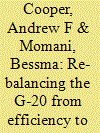

|
|
|
|
|
| Publication |
2014.
|
| Summary/Abstract |
This article contributes to the literature on global governance, legitimacy, and small states through a detailed analysis of the Global Governance Group. It examines in particular the operational impact and wider conceptual implications of the 3G's collective diplomatic efforts on the Group of 20. By engaging in a reconfigured form of informal multilateralism, the article finds that the 3G has been and is capable of shaping the global agenda with respect to the G-20 in a way that is both more inclusive and connected with existing institutions, especially the United Nations. Through this initiative, this group has effectively recalibrated the existing narrative about small states, the G-20, and global governance-shifting it from the paradigm of efficiency to one of legitimacy.
|
|
|
|
|
|
|
|
|
|
|
|
|
|
|
|
| 19 |
ID:
074571
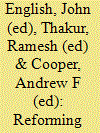

|
|
|
|
|
| Publication |
New Delhi, BookWell, 2006.
|
| Description |
xx, 319p.
|
| Standard Number |
8189640089
|
|
|
|
|
|
|
|
|
|
|
|
Copies: C:1/I:0,R:0,Q:0
Circulation
| Accession# | Call# | Current Location | Status | Policy | Location |
| 051856 | 327.101/ENG 051856 | Main | On Shelf | General | |
|
|
|
|
| 20 |
ID:
151695
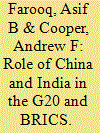

|
|
|
|
|
| Summary/Abstract |
This paper examines China and India’s relationship within the ambit of the G20 process and the autonomous BRICS institutional architecture. The evolving relationship of each of these two emerging powers within these different institutional settings demonstrates a degree of agentic commonality and distinction. China’s and India’s approaches to both the G20 and the BRICS summit processes high-light a combination of status-seeking and hedging behaviour. While China’s cautious approach is complemented by assertive leadership in matters of national interest, India’s leadership has a very specific orientation towards developmental issues. Whereas China’s approach focuses on the United States and the rest of the West, India’s approach is increasingly positioned as a response to China.
|
|
|
|
|
|
|
|
|
|
|
|
|
|
|
|
|
|
|
|
|